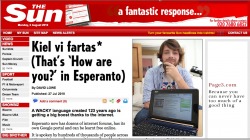Creativity, critical thinking, communication and communication can all be exercised and nurtured by teaching the simple intercultural language, Esperanto, to all our children in primary school. Esperanto fosters creativity more than other languages because of an extraordinary potential for combining word elements to create meaningful words. Sixteen rules with no exceptions provide a framework for both successful invention and critical thinking about concepts and their expression.
Esperanto enables children to communicate with peers in dozens of diverse cultures and to collaborate as a global community.
Learning Esperanto provides skills,understandings and motivation to learn other languages more effectively.
A new resource “Talking to the Whole Wide World” enables any primary teacher to teach Esperanto to fluency.








 RSS Feed
RSS Feed